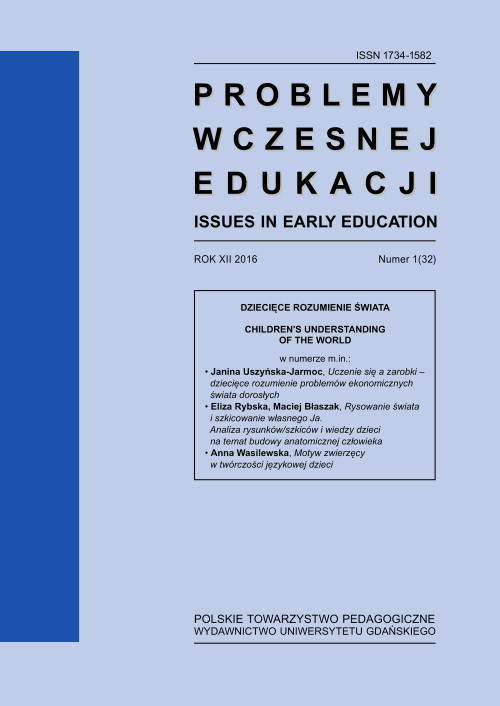Kulturoznawcze, indywidualne psychologiczne i związane z wiekiem cechy zdolności rozpoznawania emocji
DOI:
https://doi.org/10.5604/01.3001.0008.5641Słowa kluczowe:
emotion recognition, development of emotional intelligence components, age particulaities of the ability to recognize emotions, cognitive and cultural particularities of the ability to recognize emotionsAbstrakt
This article describes the features of the development of the emotional sphere. It emphasizes the importance of the primary school age in the development of certain components of emotional intelligence, one of which is the ability to recognize emotions. In the early school years, children are able to understand emotions, but mostly with the help of their own emotional experience and/ or according to the situations they are used to experiencing, they mostly rely on the context of the situation, and, as we know, it does not always work correctly: different people in the same situations may experience completely different emotions. Few children are able to establish the reasons that caused other people emotions. Besides, one of the components of emotional intelligence is the ability to control one’s own emotions. Emotion regulation becomes available for children after the socialization associated with the first years at school. Child development is partly determined by the process of socialization, which determines specific cognitive representations of emotions, so called emotional prototypes. Also the culture in which the child grows up has effects on the process of emotion recognition and expression, so, for example, in the individualistic culture emotional expression and recognition is encouraged, and in collectivist cultures, there are certain rules of emotional expression fixing in which situations and to what extent the expression of emotions is permissible.
Downloads
Bibliografia
Амонашвили Ш.А. (1998), Школа жизни. Москва, Изд-во Шалвы Амонашвили.
Бодалев A.A. (1981), О состоянии и задачах разработки психологии познания людьми друг друга. Москва, Изд-во «Педагогика».
Божович Л.И. (1968), Личность и ее формирование в детском возрасте. Москва, Изд-во «Просвещение».
Вайнер М.Э. (1997), Педагогическая коррекция недостатков эмоционального развития младших школьников в системе компенсирующего обучения. Москва.
Изотова Е.И., Никифорова Е.В. (2004), Эмоциональная сфера ребёнка: Теория и практика. Учеб. пособие для студ. высш. учеб. заведений. Москва, Издательский центр «Академия».
Люсин Д.В. (2004), Современные представления об эмоциональном интеллекте. В: Д.В. Люсин, Д.В. Ушаков (ред.), Социальный интеллект: Теория, измерение, исследования. Москва, Изд-во „Институт психологии РАН”.
Митина Г.В. (1999), Психолого-педагогическая поддержка становления личности школьника в социально-воспитательной работе (на примере школы первой ступени). Биробиджан.
Хворова Е.М. (2011), Научение распознаванию эмоциональных состояний других людей, как фактор повышающий эффективность межличностной коммуникации, III Общероссийская научно-практическая конференция «Современные исследования социальных проблем» с международным участием. Красноярск, Научно-инновационный центр.
Хворова Е.М. (2011), Роль репрезентативных систем в распознавании эмоциональных состояний. В: «Личность в межкультурном пространстве». Материалы VI Международной научно-практической конференции. Москва, РУДН.
Хворова Е.М., Беловол Е.В. (2011), Особенности невербальной семиотики у представителей различных культур. В: «Актуальные проблемы этнической и социальной психологии». Материалы межвузовской конференции студентов, аспирантов и молодых ученых. Москва, РУДН.
Щетинина А.М. (1984), Восприятие и понимание младшими школьниками эмоционального состояния человека, «Вопросы психологии», №3. Эйдемиллер Э.Г., Юстицкис В. (2000), Психология и психотерапия семьи. Питер.

 Uniwersyteckie Czasopisma Naukowe
Uniwersyteckie Czasopisma Naukowe





